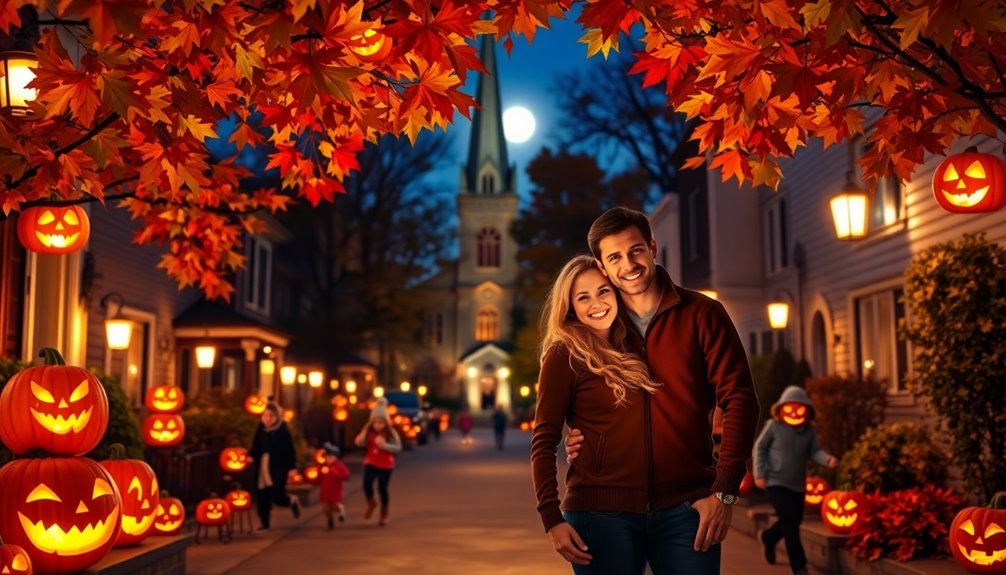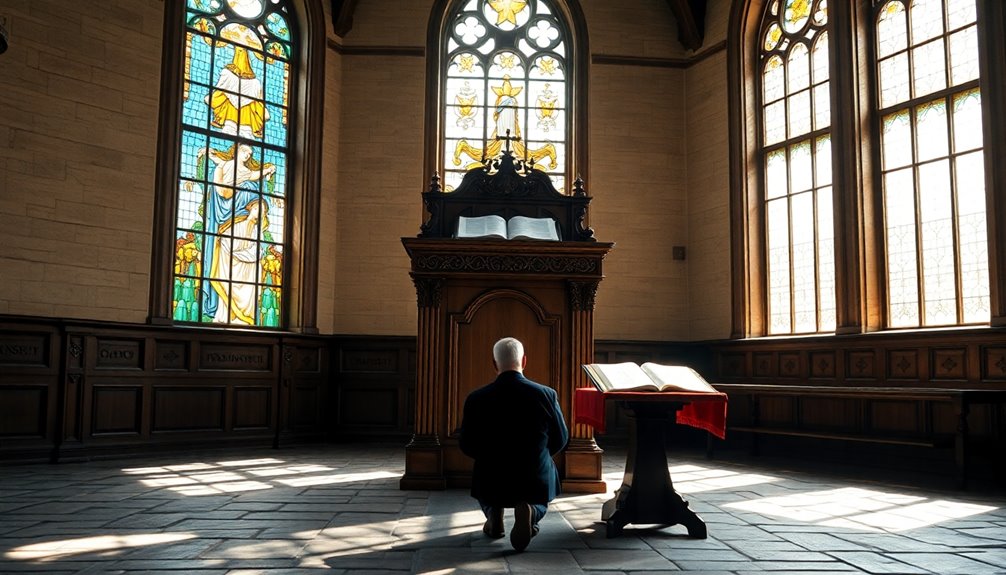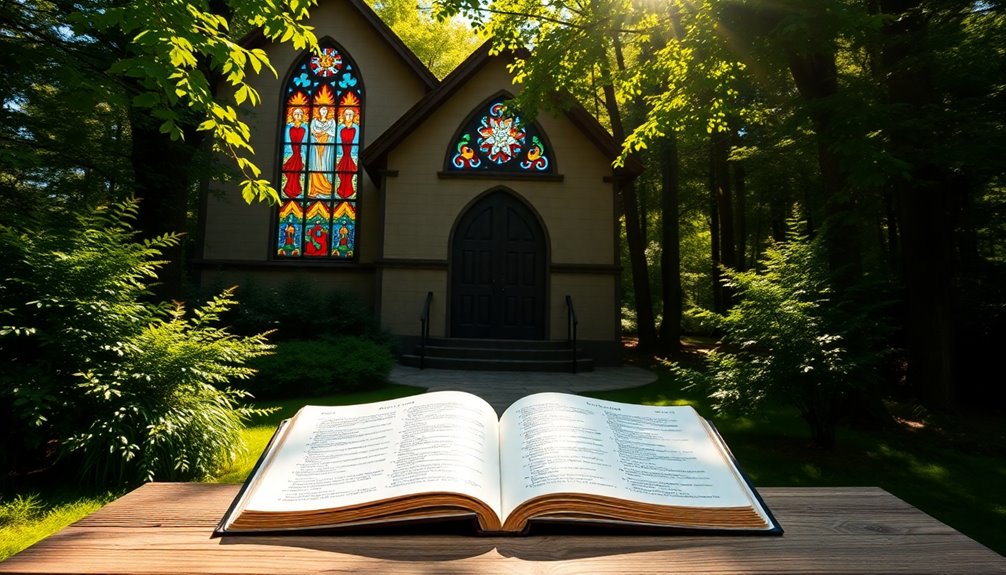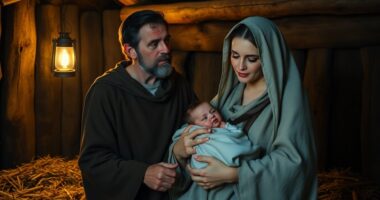Yes, Christians can celebrate Halloween by focusing on community and positive values. Many choose to engage in activities that promote fellowship and fun, like costume parties and trunk-or-treat events. It's essential to align your participation with biblical principles, emphasizing light over darkness. Some Christians opt for alternatives such as Harvest Festivals or themed gatherings that highlight faith. However, personal convictions play a crucial role, and each individual may approach Halloween differently. If you explore further, you'll discover various ways Christians can celebrate this holiday meaningfully while fostering community connections and staying true to their beliefs.
Key Takeaways
- Christians have diverse views on Halloween, with some seeing it as harmless fun and others viewing it as a celebration of darkness.
- Biblical guidance encourages actions to glorify God, suggesting Christians evaluate Halloween practices against their values and beliefs.
- Community engagement during Halloween, such as trunk-or-treats, can foster fellowship and provide safe environments for children.
- Alternatives like Harvest Festivals focus on Christian values and can serve as wholesome celebrations while avoiding darker themes of Halloween.
- Personal convictions are essential; Christians should consider their beliefs and the impact of their participation on others when deciding about Halloween.
Introduction
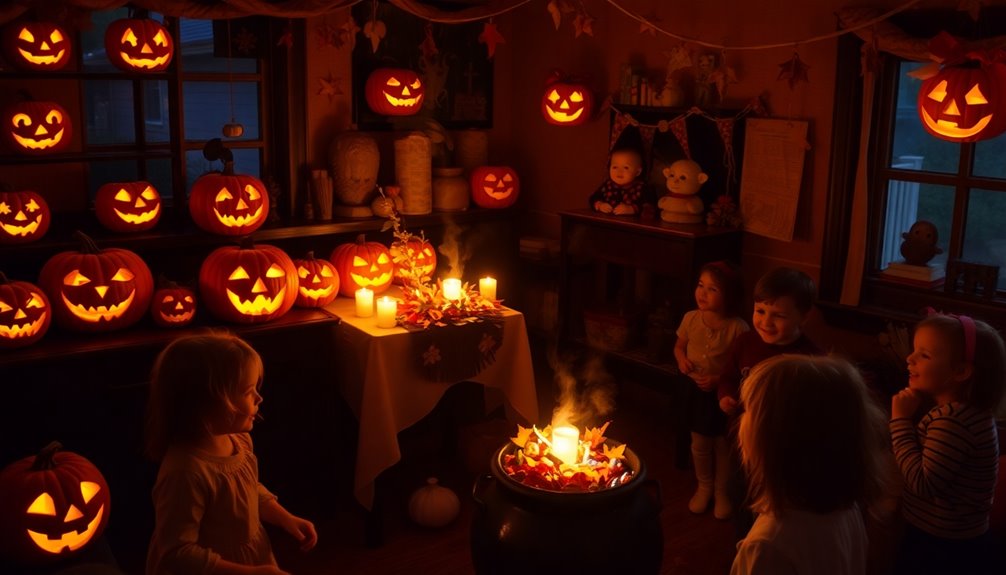
Halloween stirs up a mix of excitement and apprehension among Christians. With its pagan origins linked to the ancient Celtic festival of Samhain, where rituals honored the dead and warded off spirits, the holiday can raise questions about its appropriateness for Christian celebration.
As time went on, Halloween evolved, blending elements of Christianity, particularly through the establishment of All Saints Day by the Catholic Church.
You might find that perspectives among Christians vary widely. Some view Halloween as a harmless opportunity to dress up in fun costumes and engage with their community, while others see it as a celebration of darkness and evil. This divergence often leads to differing opinions about how to participate, if at all.
When considering how to celebrate, it's essential to remember that many guidelines emphasize avoiding darker themes. Instead, focusing on innocent costumes and positive community events can align with Christian values.
Ultimately, the decision to celebrate Halloween is personal, shaped by your own convictions and those of your family. Balancing tradition with faith can help you navigate this festive season meaningfully.
Biblical Guidance on Celebrations
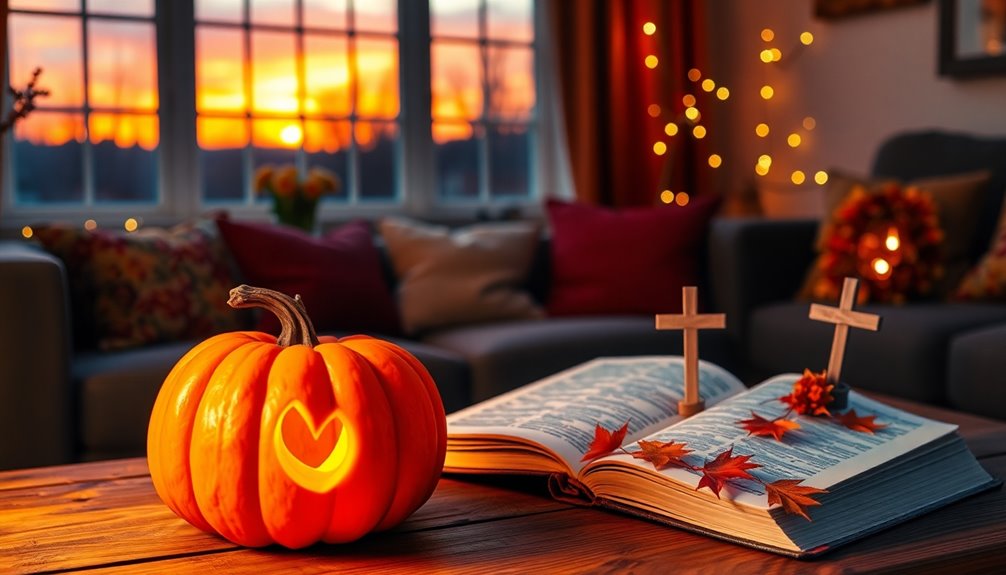
When considering whether to celebrate Halloween, it's important to look at what the Bible says about celebrations.
Scripture provides guidance on how to evaluate our choices, emphasizing light over darkness and the need for unity within our communities.
Let's explore some key Bible references that can help you navigate this decision.
Primary Bible References
Several key Bible verses provide guidance for Christians considering participation in celebrations like Halloween. While the Bible doesn't mention Halloween directly, it offers principles to evaluate worldly celebrations.
Ephesians 5:7-15 urges you to align your actions with God's desires, reminding you to avoid practices that don't reflect His glory.
Old Testament laws, such as those in Deuteronomy 18:10-12, explicitly prohibit witchcraft and sorcery, raising questions about Halloween's ties to the occult. Similarly, New Testament accounts in Acts 8:9-24 and Acts 19:19 show the dangers of magic arts, emphasizing that these practices clash with a Christian lifestyle.
Romans 14 encourages you to consider your personal convictions and be mindful of how your decisions might impact others. This is crucial when deciding whether to participate in Halloween.
Ultimately, all your actions, including those related to this holiday, should aim to glorify God, as stated in 1 Corinthians 10:31. By reflecting on these scriptures, you can make a more informed choice about how to approach Halloween in a way that honors your faith.
Secondary Bible References
As you navigate celebrations, it's essential to apply biblical principles that guide your choices and actions. While the Bible doesn't mention Halloween directly, it offers wisdom for evaluating the appropriateness of such festivities.
Ephesians 5:7-15 encourages discernment, urging you to assess if your participation aligns with God's will.
Romans 14 highlights the importance of individual convictions, reminding you to act in love and avoid causing others to stumble. If you choose to celebrate Halloween, consider how it reflects your faith and values.
In 1 Corinthians 10:31, you're instructed to do everything for the glory of God, suggesting your involvement should honor Him.
However, be cautious of Deuteronomy 18:10-12, which warns against engaging in pagan practices. This scripture can guide you in deciding whether Halloween's origins might conflict with your beliefs.
Acts 19:19 reinforces this call to purity, showing early Christians renouncing occult practices.
Pagan Origins of Halloween

Halloween's roots are deeply intertwined with ancient pagan traditions, particularly the Celtic festival of Samhain. This pagan celebration marked the end of the harvest season and was believed to be a time when spirits returned to the earth. People lit bonfires and donned costumes to ward off these wandering spirits, practices that have significantly shaped modern Halloween traditions.
In the 8th century, the Catholic Church established All Hallows Eve on October 31 to coincide with Samhain, blending Christian and pagan elements. This merging helped to create a framework for contemporary customs.
You might notice that many aspects of Halloween, like trick-or-treating and dressing up, evolved from a combination of pagan rituals, superstitions, and regional traditions over the centuries.
Despite its commercialization, Halloween retains strong connections to its pagan origins, which has led to ongoing debates about its appropriateness for Christians.
As you celebrate Halloween, it's essential to recognize these roots and consider how they align with your beliefs. Understanding the origins can help you make informed choices about your participation in this cultural event.
Cultural Significance of Halloween
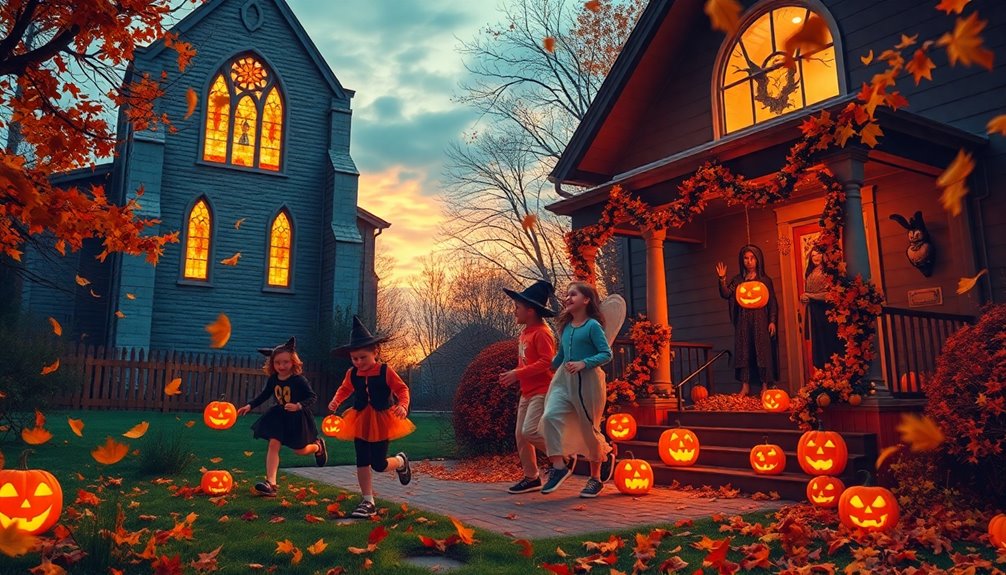
Understanding the historical context of Halloween reveals its complex cultural significance today. Originating from the ancient Celtic festival of Samhain, Halloween marked the transition from harvest to winter, a time when people believed spirits returned to the earthly realm. The term "Halloween" comes from "All Hallows Eve," established by the Catholic Church to honor saints and the deceased, blending pagan practices with Christian observance.
Today, Halloween is a colorful mix of traditions, from trick-or-treating and costume-wearing to pumpkin carving. While many view it as a harmless celebration, others argue it trivializes themes of evil and death, reflecting a tension in how people perceive the day. For Christians, this duality can pose a challenge.
On one hand, Halloween can be a fun way to engage with community, but on the other, its darker themes may conflict with Christian values. The holiday's commercial success in the U.S. further complicates matters, as billions are spent on costumes and decorations, highlighting its widespread cultural impact.
Ultimately, how you choose to celebrate Halloween may depend on your beliefs and values as a Christian in today's society.
Halloween's Impact on Faith
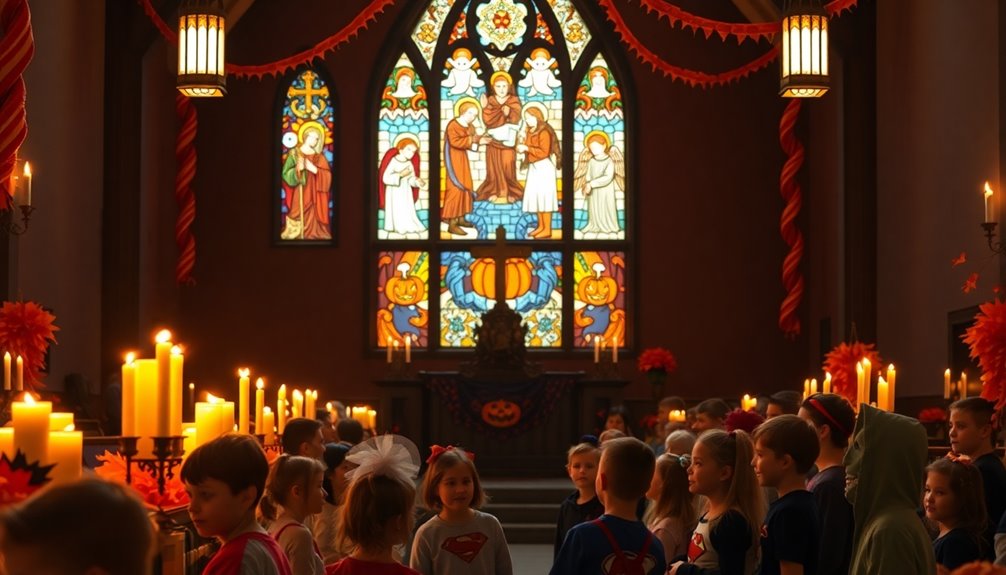
As you consider Halloween, think about how superstition and cultural appropriation might affect your faith.
It's important to weigh the potential for misinterpretation against your values and beliefs.
How can you celebrate in a way that honors your faith while engaging with the community?
Debunk Halloween Superstition Beliefs
Many Christians see Halloween as a chance to engage with their community rather than a day filled with superstition. Instead of avoiding Halloween due to its historical ties to pagan rituals, many focus on its potential for positive experiences like fellowship and family bonding. Dressing up or trick-or-treating can be reframed as opportunities for outreach, showcasing joy and creativity without endorsing any occult beliefs.
Scripture underscores the significance of intention and behavior, suggesting that you can celebrate Halloween in a way that aligns with your faith. The celebration doesn't have to reflect its origins; it can instead embody values of love, community, and connection. By participating in Halloween activities, you can demonstrate that there's more to the celebration than superstitions.
Open discussions within Christian communities about Halloween can also dispel myths and help clarify its significance. Engaging in these conversations allows you to make informed choices about how to approach Halloween, ensuring your participation honors your beliefs.
Ultimately, Halloween can be a time of joy and connection, breaking free from the chains of superstition if approached with the right mindset.
Cultural Appropriation Concerns
While Halloween can offer opportunities for community engagement and joy, it also raises valid concerns about cultural appropriation and the impact on faith. Many Christians worry that celebrating Halloween might dilute their beliefs and inadvertently honor pagan practices that originated with rituals like Samhain.
The commercialization of Halloween adds to this complexity, as it can trivialize the spiritual significance of death and evil, leading you to question whether participating aligns with your faith.
Furthermore, the perception that Halloween trivializes evil can send mixed messages to children and the community about your beliefs. Engaging in festivities without considering their historical context may foster a casual attitude toward spiritual matters, which can be detrimental to your faith journey.
In response, some Christian communities advocate for alternatives, such as Harvest Festivals, allowing for fun while steering clear of potential conflicts. These alternatives can help you maintain your spiritual integrity while still enjoying the camaraderie of community gatherings.
Ultimately, it's essential to reflect on your values and how celebrating Halloween—or opting out—impacts your faith and the messages you convey to others.
Community Outreach Events
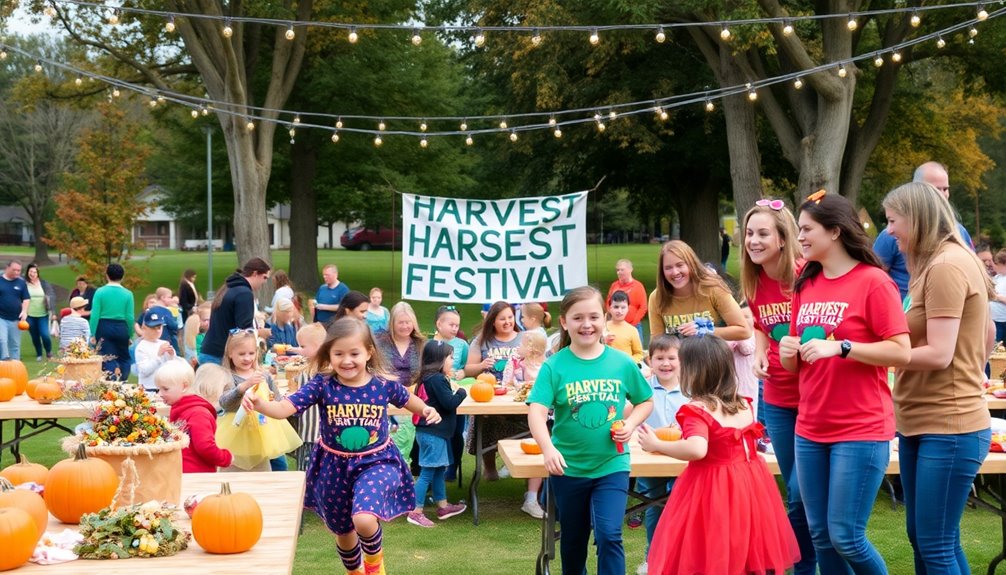
As you think about Halloween, consider how family costume traditions and neighborhood trunk-or-treat events can create lasting memories.
These community outreach events not only provide a safe space for kids but also foster connections with your neighbors.
Family Costume Traditions
Family costume traditions can be a vibrant part of community outreach during Halloween, turning what's often seen as a spooky holiday into an opportunity for connection and celebration. By choosing themes that reflect positive values, like Bible characters or historical figures, you can foster creativity while steering clear of darker themes. This approach not only brings joy to your family but also resonates with the spirit of the season.
Participating in community events, such as church-organized trunk-or-treats and fall festivals, allows you to engage with neighbors in a safe environment. During these gatherings, you can share the gospel through friendly conversations and by distributing Gospel tracts alongside treats.
Fun activities like hayrides, games, and storytelling create an atmosphere of joy and fellowship, countering the more frightening aspects of Halloween.
Ultimately, these family costume traditions and outreach activities demonstrate your commitment to sharing love and light. By engaging positively with your community, you transform Halloween into a time of celebration and connection, rather than fear or darkness.
Embrace this opportunity to connect with others and make a meaningful impact this Halloween.
Neighborhood Trunk-or-Treat Events
Neighborhood trunk-or-treat events create a fun and safe environment for families to celebrate Halloween together. These gatherings, often organized by local churches or community groups, invite families to decorate their car trunks and provide candy to children.
You'll find that trunk-or-treats typically feature games, hayrides, and costume contests, allowing everyone to enjoy a festive atmosphere while steering clear of the darker themes often associated with Halloween.
As a Christian, you might appreciate how these events foster community spirit. They encourage neighbors to gather, socialize, and build relationships, providing a perfect opportunity for outreach and connection.
Many churches use trunk-or-treat events as a platform to share positive messages or distribute gospel materials alongside candy, promoting faith-based interactions during the holiday.
Participating in trunk-or-treat events allows you and your family to enjoy Halloween festivities while focusing on community engagement. You'll feel reassured knowing your kids are in a safe environment, surrounded by friends and neighbors.
This way, you can celebrate the joy of the season while upholding your values. So, if you're looking for a way to join in, consider attending a trunk-or-treat where Christians are going, and enjoy the festivities!
Faith-Based Halloween Alternatives
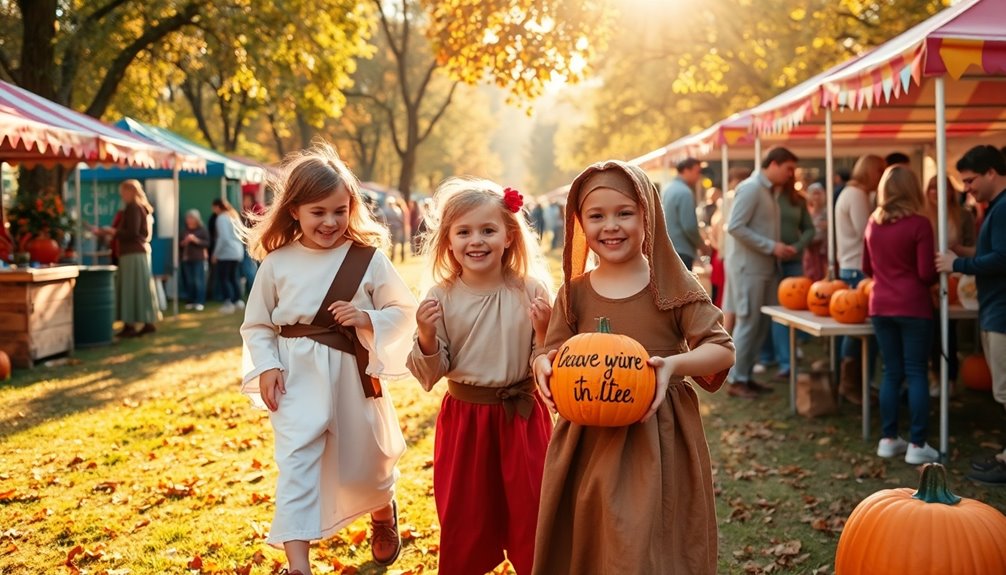
Many churches are stepping up to create faith-based alternatives to Halloween that prioritize community spirit and Christian values. One popular option is the Harvest Festival, where families can come together to enjoy fun activities without the darker themes often associated with traditional Halloween.
These festivals encourage fellowship and engagement, allowing everyone to celebrate in a positive atmosphere.
Trunk-or-treating is another excellent choice, providing a safe environment for children to dress up and collect treats while participating in wholesome activities.
You might also consider hosting a Fall Festival party at home, featuring games and activities centered around Bible stories or characters. This not only fosters a fun environment but also reinforces important lessons.
Encouraging kids to dress as biblical figures or positive role models can deepen their understanding of faith while they enjoy the festive spirit.
Additionally, distributing gospel tracts or Christian-themed treats at community events can transform Halloween into an opportunity for outreach.
Additional Resources
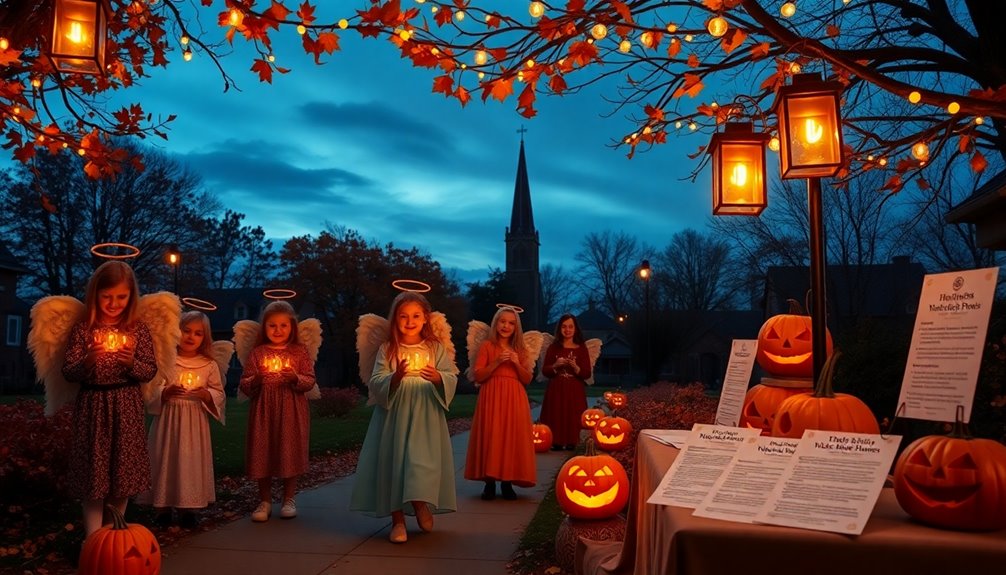
When exploring how to celebrate Halloween in a way that aligns with Christian values, you'll find a wealth of additional resources to guide you. Many churches offer alternative celebrations like harvest festivals or trunk-or-treat events, providing safe environments for families to engage in community activities without compromising their beliefs.
You can also look for resources such as "Steps to Peace with God" booklets, which serve as excellent outreach tools while handing out treats. Engaging in discussions with fellow Christians about various perspectives on Halloween can foster understanding and unity within your community, allowing you to navigate your participation in the holiday thoughtfully.
Additionally, numerous online articles and books delve into the history of Halloween, helping you better understand its origins and the implications for your faith. Connecting with local Christian communities can further support your quest for ideas and inspiration on celebrating Halloween in alignment with your personal convictions.
Frequently Asked Questions
Is It Okay for Christians to Celebrate Halloween?
When you consider whether it's okay to celebrate Halloween, reflect on your values and beliefs.
Some Christians see it as a chance for community fun, while others prefer to steer clear. You might find joy in innocent costumes or local events that align with your faith.
Remember, it's essential to stay true to your convictions and seek alternatives that promote fellowship without compromising your principles.
Ultimately, it's your choice to make.
What Does God Say About Halloween?
God doesn't specifically mention Halloween, but He calls you to live in the light and avoid darkness.
You'll find guidance in scriptures like Ephesians 5:7-15, where discernment is key. While celebrating, consider how your actions align with God's desires and values.
Remember Romans 14 encourages you to be mindful of others' faith.
Ultimately, focus on glorifying God in everything you do, even during festive times, fostering community and outreach.
Should Christians Go Trick or Treating?
If you're considering whether to go trick-or-treating, think about what feels right for you and your family.
You can enjoy the fun of costumes and candy while keeping your values in mind. Many families choose light-hearted costumes and participate in community events that promote safety and positivity.
Discuss your thoughts with your loved ones to ensure everyone's on the same page.
Ultimately, it's about making choices that align with your beliefs and values.
Is Halloween the Devil's Holiday?
You might wonder if Halloween is the Devil's holiday. Many see its roots in pagan rituals and occult practices, raising concerns about its associations with darkness.
While some argue it promotes evil, others believe it can be a fun, harmless celebration. Ultimately, your stance will depend on how you interpret its history and symbolism.
It's important to reflect on your values and consider how participating might affect your spiritual beliefs.

